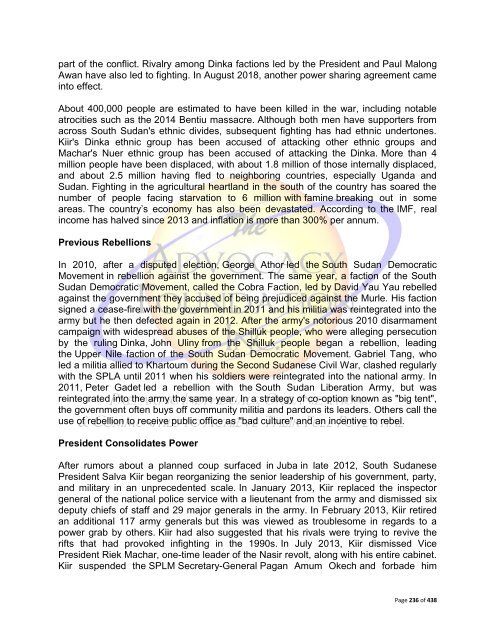Conflicts to Watch in The New Millennium
Conflicts to Watch in The New Millennium
Conflicts to Watch in The New Millennium
- No tags were found...
You also want an ePaper? Increase the reach of your titles
YUMPU automatically turns print PDFs into web optimized ePapers that Google loves.
part of the conflict. Rivalry among D<strong>in</strong>ka factions led by the President and Paul Malong<br />
Awan have also led <strong>to</strong> fight<strong>in</strong>g. In August 2018, another power shar<strong>in</strong>g agreement came<br />
<strong>in</strong><strong>to</strong> effect.<br />
About 400,000 people are estimated <strong>to</strong> have been killed <strong>in</strong> the war, <strong>in</strong>clud<strong>in</strong>g notable<br />
atrocities such as the 2014 Bentiu massacre. Although both men have supporters from<br />
across South Sudan's ethnic divides, subsequent fight<strong>in</strong>g has had ethnic under<strong>to</strong>nes.<br />
Kiir's D<strong>in</strong>ka ethnic group has been accused of attack<strong>in</strong>g other ethnic groups and<br />
Machar's Nuer ethnic group has been accused of attack<strong>in</strong>g the D<strong>in</strong>ka. More than 4<br />
million people have been displaced, with about 1.8 million of those <strong>in</strong>ternally displaced,<br />
and about 2.5 million hav<strong>in</strong>g fled <strong>to</strong> neighbor<strong>in</strong>g countries, especially Uganda and<br />
Sudan. Fight<strong>in</strong>g <strong>in</strong> the agricultural heartland <strong>in</strong> the south of the country has soared the<br />
number of people fac<strong>in</strong>g starvation <strong>to</strong> 6 million with fam<strong>in</strong>e break<strong>in</strong>g out <strong>in</strong> some<br />
areas. <strong>The</strong> country’s economy has also been devastated. Accord<strong>in</strong>g <strong>to</strong> the IMF, real<br />
<strong>in</strong>come has halved s<strong>in</strong>ce 2013 and <strong>in</strong>flation is more than 300% per annum.<br />
Previous Rebellions<br />
In 2010, after a disputed election, George Athor led the South Sudan Democratic<br />
Movement <strong>in</strong> rebellion aga<strong>in</strong>st the government. <strong>The</strong> same year, a faction of the South<br />
Sudan Democratic Movement, called the Cobra Faction, led by David Yau Yau rebelled<br />
aga<strong>in</strong>st the government they accused of be<strong>in</strong>g prejudiced aga<strong>in</strong>st the Murle. His faction<br />
signed a cease-fire with the government <strong>in</strong> 2011 and his militia was re<strong>in</strong>tegrated <strong>in</strong><strong>to</strong> the<br />
army but he then defected aga<strong>in</strong> <strong>in</strong> 2012. After the army's no<strong>to</strong>rious 2010 disarmament<br />
campaign with widespread abuses of the Shilluk people, who were alleg<strong>in</strong>g persecution<br />
by the rul<strong>in</strong>g D<strong>in</strong>ka, John Ul<strong>in</strong>y from the Shilluk people began a rebellion, lead<strong>in</strong>g<br />
the Upper Nile faction of the South Sudan Democratic Movement. Gabriel Tang, who<br />
led a militia allied <strong>to</strong> Khar<strong>to</strong>um dur<strong>in</strong>g the Second Sudanese Civil War, clashed regularly<br />
with the SPLA until 2011 when his soldiers were re<strong>in</strong>tegrated <strong>in</strong><strong>to</strong> the national army. In<br />
2011, Peter Gadet led a rebellion with the South Sudan Liberation Army, but was<br />
re<strong>in</strong>tegrated <strong>in</strong><strong>to</strong> the army the same year. In a strategy of co-option known as "big tent",<br />
the government often buys off community militia and pardons its leaders. Others call the<br />
use of rebellion <strong>to</strong> receive public office as "bad culture" and an <strong>in</strong>centive <strong>to</strong> rebel.<br />
President Consolidates Power<br />
After rumors about a planned coup surfaced <strong>in</strong> Juba <strong>in</strong> late 2012, South Sudanese<br />
President Salva Kiir began reorganiz<strong>in</strong>g the senior leadership of his government, party,<br />
and military <strong>in</strong> an unprecedented scale. In January 2013, Kiir replaced the <strong>in</strong>spec<strong>to</strong>r<br />
general of the national police service with a lieutenant from the army and dismissed six<br />
deputy chiefs of staff and 29 major generals <strong>in</strong> the army. In February 2013, Kiir retired<br />
an additional 117 army generals but this was viewed as troublesome <strong>in</strong> regards <strong>to</strong> a<br />
power grab by others. Kiir had also suggested that his rivals were try<strong>in</strong>g <strong>to</strong> revive the<br />
rifts that had provoked <strong>in</strong>fight<strong>in</strong>g <strong>in</strong> the 1990s. In July 2013, Kiir dismissed Vice<br />
President Riek Machar, one-time leader of the Nasir revolt, along with his entire cab<strong>in</strong>et.<br />
Kiir suspended the SPLM Secretary-General Pagan Amum Okech and forbade him<br />
Page 236 of 438

















